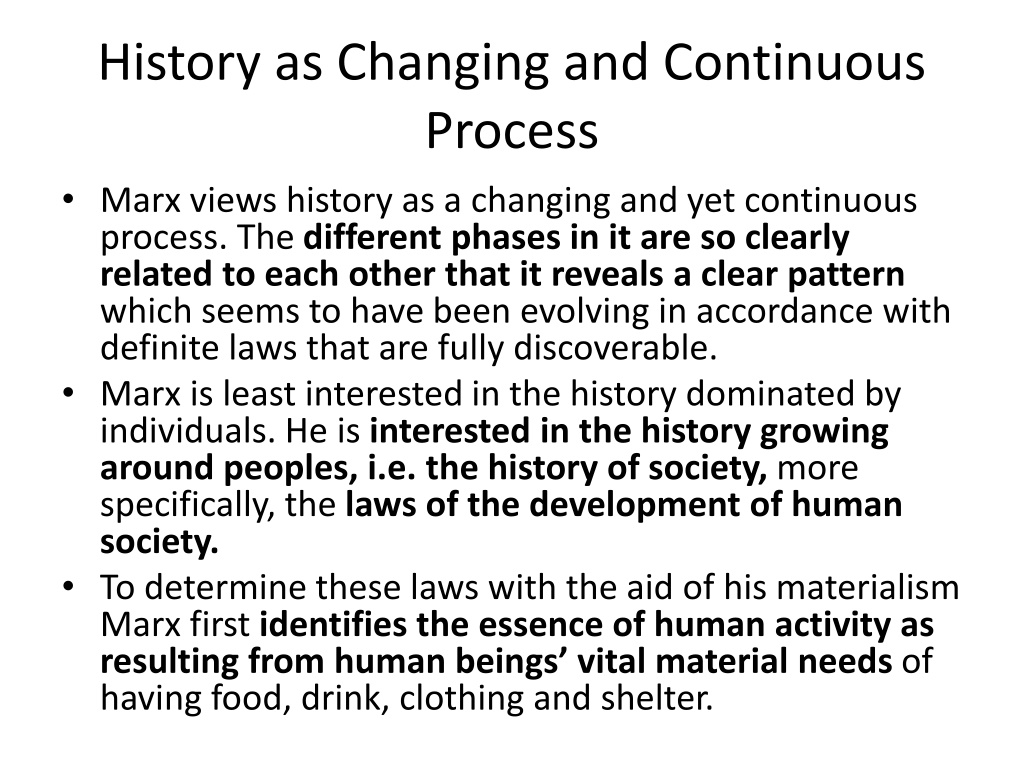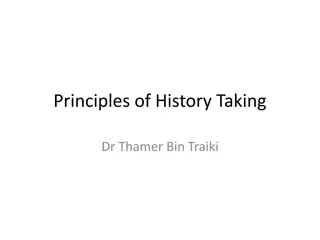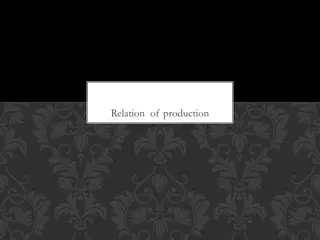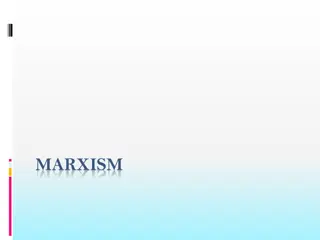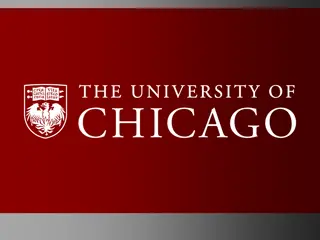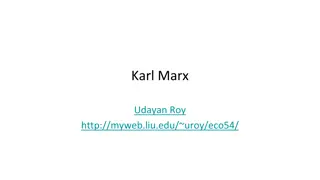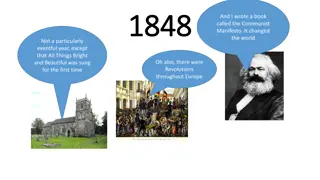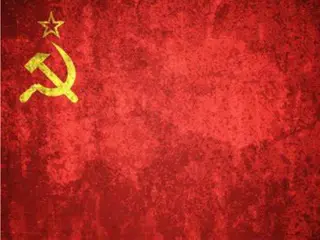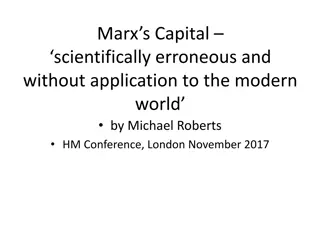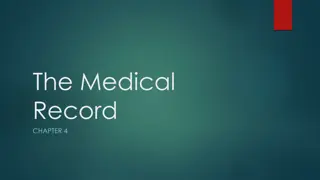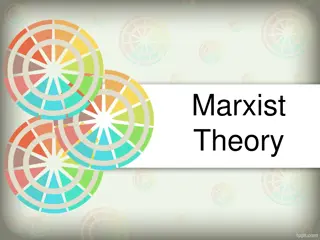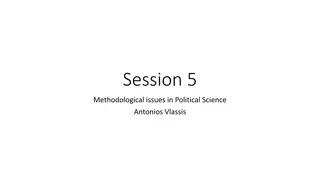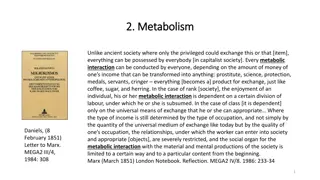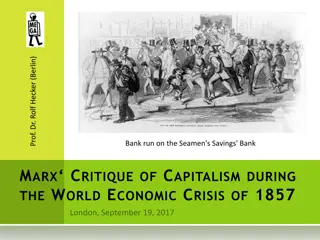Understanding Marx's View on History as a Changing Process
Marx views history as a continuous process evolving according to discoverable laws, rooted in human material needs. He emphasizes the role of the mode of production in shaping social development, with changes in history driven by changes in the mode of production, leading to shifts in social relations and property relations. Through his materialist perspective, Marx highlights the interconnectedness of individuals within society and their collective efforts in production.
Download Presentation

Please find below an Image/Link to download the presentation.
The content on the website is provided AS IS for your information and personal use only. It may not be sold, licensed, or shared on other websites without obtaining consent from the author. Download presentation by click this link. If you encounter any issues during the download, it is possible that the publisher has removed the file from their server.
E N D
Presentation Transcript
History as Changing and Continuous Process Marx views history as a changing and yet continuous process. The different phases in it are so clearly related to each other that it reveals a clear pattern which seems to have been evolving in accordance with definite laws that are fully discoverable. Marx is least interested in the history dominated by individuals. He is interested in the history growing around peoples, i.e. the history of society, more specifically, the laws of the development of human society. To determine these laws with the aid of his materialism Marx first identifies the essence of human activity as resulting from human beings vital material needs of having food, drink, clothing and shelter.
Conditions of Material Life Whatever things human beings can do are all conditional on their having secured the means of life; the way they live is very much determined by the way they make their living. So the history of social development may alone be known on the basis of the conditions of material life of society. For Marx it is the mode of production that reflects these conditions. Every society, thus, thrives on a particular mode of production and it is the latter that determines all activities and institutions of that society.
Changes Occur due to Changes in the Mode of Production Then Marx goes on to explain how changes in history occur due to changes in the mode of production. Production, by nature, is a social activity for it is impossible for an individual to produce alone the necessities of life. Means of life are produced only by the collective efforts of individuals. Hence the mode of production must always be viewed in its social aspect. Considering the social aspect of the mode of production it is found to have two basic components- i. Forces of Production; and ii. Relations of Production
Changes Occur(contd.) In order to produce, various means of production like tools, machines, raw materials, land, buildings, etc. are needed. These means of production, however, do not by themselves produce things. Production is made possible only when the means of production are used and utilized by people on the basis of their knowledge, skill and experience. The forces of production represent both these means of production as well as the people who use these means. Since, by its very nature, production is social people have to enter into mutual social relationship with each other while engaging in production.
Social Relations are Property Relations These relations develop in the context of the way in which people engaged in production are related to the means of production. The social relations people develop among themselves while engaged in social production are, in fact, the property relations. These relations, however, are not the outcome of a deliberate act on the part of the people. Such relations are, in fact, conditioned by the pattern of development of the forces of production. In the primitive type of production where a whole tribe was collectively engaged in hunting expedition the forces of production were such that there was no division of labour, and thus, no classes. It was unnecessary to determine as to who was entitled to dispose of what kinds of means of production.
Emergence of Classes with Private Property But later with the further development of the forces of production there emerged division of labour. Because the means of production came to be regarded as the private property of particular persons. Consequently, the simple and direct relations among people began assuming the form of property relations. Thus relations among people were now determined on the basis of the ownership and lack of ownership of the means of production. It is the totality of these relations of production that constitutes the economic structure of society and it is this that represents the real foundation of a society on which grow its legal and political superstructures. It is also this which conditions definite forms of social consciousness.
Change in the Mode of Production Caused by Antagonism It is now evident that social change results from a change in the mode of production that is caused by an antagonism between the forces of production and the relations of production. The forces of production of a society at a certain stage of their development come in conflict with the existing relations of production, which is the property relations and the consequence is a social revolution. In all hitherto existing societies, except in primitive society, according to Marx, the relations of production have always appeared as a relation of domination and subordination among classes as in all such societies the mode of production has been marked by the presence of exploiting and exploited classes.
Class Struggle As explained earlier, class divisions are the natural outcome of property relations following from the division of labour. Because of this division of labour different groups occupy different places in social production. As a result they stand in different relations to the means of production and hence appropriate the social product differently. Social classes refer to these groups the relations among which represent the class relations of a society. Such class relations are characterized by a persistent conflict which is of a fundamental nature and thus, will only result in a revolutionary transformation of the society.
Class Struggle (contd.) By virtue of their ownership of the means of production one class lives without labour on the fruits of labour of the other class which does not own the means of production. Thus, the class owning the means of production appropriate most of the social wealth and thereby exploit the other class which is without ownership over the means of production. The exploited class owns nothing except their labour power which it is forced to sell for its bare sustenance. Thus the relations between these classes cannot be anything but antagonistic and the conflicts are irreconcilable in nature.
History is History of Class Struggles For Marx, all hitherto existing societies have been marked by class conflicts and, therefore, their history must always be taken to be a history of class struggles. It is with the aid of these general laws of history that Marx points out how in course of historical development different types of societies have evolved on the basis of different types of production relations. In the earliest phase of known human history Marx identifies the primitive communist society where the means of production are held in common, generating no property relations and which, therefore, is conspicuous by the absence of classes and exploitation.
History is(contd.) But, with the development of metal tools and consequent changes in productive activities, that is, with changes in the forces of production there came about division of labour and consequently property relations, leading to the emergence of slave society where the master class owns the means of production. The labouring slaves divorced from the means of production are exploited by the non-labouring slave- owners who appropriate most of the social product. With changes in productive forces calling for initiative and interest on the part of those who produce, the slave society breaks down and in its place rises the feudal society.
History is(contd.) Here the feudal lords represent the exploiting class who own the principal means of production, but who, however, are no longer masters of slaves and have no legal right over the persons of the toilers. The serfs (the labouring class), on the other hand, have some of the means of production in their possession. This is allowed to only to enable them to show initiative and have interest in the cultivation of land which is the chief productive activity in the feudal society. Yet the serfs are very much exploited as they have to hand over a substantial portion of the produce from the land to the feudal lords and are also bound to give them services.
History is(contd.) Due to changes further in the forces of production the feudal society disintegrates and there grows on its ruins the capitalist society. In the capitalist society it is the capitalist who owns the means of production, but not the workers who actually produce. Thus in a sense, those who labour to produce are personally free. But in practice there is no less exploitation here. Since the working class is entirely divorced from the means of production and they have nothing except their labour power they are forced to sell it for wages just to collect their means of subsistence.
Socialist Society: An Inevitability Like the previous social systems the capitalist society is also not permanent. It is liable to change and the inevitability of this change is more and more manifest when the capitalist productive forces are fully developed. It is at this point that an irreconcilable contradiction of capitalism will come to the fore. The more and more capitalism is developed the more and more its productive forces tend to become social. Development of capitalism is achieved through expanding production and employing millions of workers in large mills and factories. Thus development capitalism is brought about through extending the area of collective effort and labour, that is, by way of an increasing socialization of the forces of production.
Socialist Society:(contd.) This naturally calls for a social ownership of the means of production which alone will ensure a harmony between the forces of production and the relations of production. But under the capitalist system the means of production always remain private capitalist property. Thus, at a certain stage of its development, capitalism faces a contradiction that foreshadows the imminence of change- a change that would be in the direction of a change in the ownership of the means of production. In other words, capitalism is forced by the laws of history to be replaced by the socialist society where means of production are fully socialized which will result in the end of exploitation of man by man.
Socialist Society:(contd.) The working class, the property-less proletariat would be the vanguard of a process of revolutionary change in the socialist direction. At a developed stage of capitalism the social productive forces have simply outgrown the control of the bourgeoisie. So it is now the turn of the working class to assume leadership. For this the working class needs to be fully aware of its suffering in the capitalist system. Thus, it is necessary to open their minds by exposing the nature and working of the capitalist mode of production. This is exactly what Marx does by focusing on his economic theory of capitalism- the theory of surplus value.
